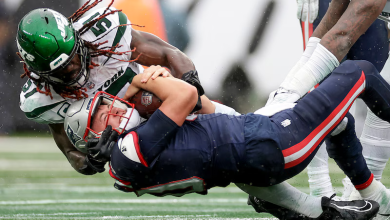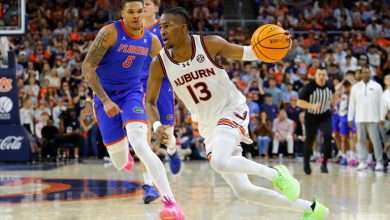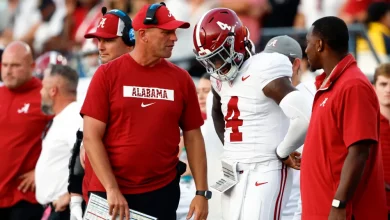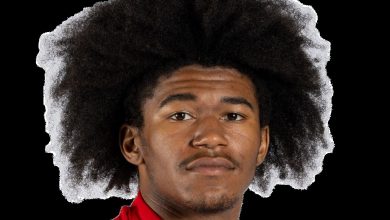The LSU was miswired by TJ Finley.
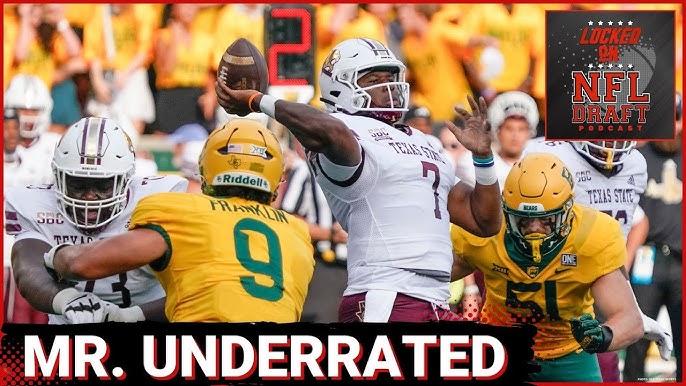
The LSU Tigers and the Miswired Experience: The TJ Finley Era
In the world of college football, the quarterback position has always been a focal point. The quarterback is often seen as the leader of the offense, tasked with driving the team’s success and shouldering much of the responsibility for both victories and losses. Over the years, the LSU Tigers have seen some incredible talent at the quarterback position, including names like Joe Burrow, who led the team to a national championship in 2019. However, one quarterback whose tenure at LSU has been clouded with inconsistency and missed opportunities is TJ Finley, whose time with the Tigers was marked by a series of missteps, confusion, and misalignment, both on and off the field.
Finley’s story at LSU is one of great potential that was never fully realized, often leaving fans and analysts to wonder what could have been. In this article, we will delve into the rise of TJ Finley at LSU, how he was miswired by both circumstances and coaching decisions, and what it means for the LSU Tigers as they look to move forward with their quarterback situation.
The Arrival of TJ Finley: Promise Meets Opportunity
TJ Finley arrived at LSU with plenty of promise. A highly-rated recruit from Ponchatoula, Louisiana, Finley was viewed as one of the top quarterbacks in the 2020 recruiting class. His size (standing at 6’6” and weighing around 245 pounds), strong arm, and raw talent caught the attention of scouts and coaches alike. At LSU, he was seen as the next big thing in Baton Rouge—a player who could eventually lead the Tigers back to prominence.
Finley was thrust into the spotlight relatively early. LSU’s 2020 season was marked by inconsistency at the quarterback position following the departure of Heisman Trophy winner Joe Burrow. With the Tigers coming off a national championship season, expectations were high for the next quarterback to step in and continue LSU’s winning tradition.
However, the 2020 season was not kind to LSU or Finley. The Tigers were reeling from the loss of many key players from their championship team, and a combination of injuries and poor performances left the team in disarray. Finley, who was expected to learn behind Myles Brennan, quickly found himself starting in key games due to Brennan’s injury. The start of his career was rocky, but there were flashes of potential that hinted at what Finley could become.
In his debut, Finley showed promise in a game against South Carolina, where he passed for 265 yards and two touchdowns. But while his physical tools were undeniable, the consistency and decision-making that college football demands were lacking. Finley’s time as LSU’s starting quarterback was marked by inconsistency, turnovers, and moments of brilliance followed by frustrating mistakes.
The Miswiring Begins: Challenges on the Field
Despite the promise Finley showed early in his career, his development at LSU was marred by several factors that contributed to his overall underperformance. A significant aspect of Finley’s struggles at LSU can be attributed to the lack of proper development and mentorship during his time with the program.
1. Lack of Stability at the Quarterback Position
One of the main issues during Finley’s time at LSU was the constant upheaval and lack of continuity at the quarterback position. Following Joe Burrow’s departure, LSU struggled to find a reliable signal-caller. Myles Brennan was the projected starter but dealt with injuries throughout the 2020 season, which opened the door for Finley and other quarterbacks to see significant playing time. However, the lack of a stable quarterback situation hurt the team’s overall cohesion.
For a young quarterback like Finley, the absence of continuity and stability around him was detrimental to his growth. Quarterbacks thrive when they can establish a rhythm, build chemistry with their receivers, and have confidence in their offensive line and coaching staff. Unfortunately for Finley, the constant shuffling of the quarterback position, coupled with LSU’s struggles on offense, contributed to his uneven performance.
2. Offensive System and Coaching Changes
Another factor that played into Finley’s miswiring at LSU was the inconsistency in the offensive system and coaching staff. The LSU Tigers underwent significant coaching changes during Finley’s tenure. In 2020, head coach Ed Orgeron and offensive coordinator Steve Ensminger struggled to find the right formula to replicate the success of the previous season, when the offense was firing on all cylinders with Burrow, Ja’Marr Chase, and Justin Jefferson.
For Finley, this meant operating in an offense that was not fully suited to his skill set. He was often asked to make quick decisions and throw passes under pressure, something that was difficult given the instability of the offensive line and the lack of elite playmakers around him. The lack of a cohesive offensive identity, combined with changes in coaching personnel, made it harder for Finley to find his footing and settle into a rhythm.
Moreover, Finley’s raw talent was undeniable, but he lacked the refinement needed to succeed at the highest level. As a young quarterback with so much potential, Finley needed a coaching staff that could help him develop the finer points of his game—particularly in terms of reading defenses, making quick decisions, and improving his accuracy. Unfortunately, due to the shifting coaching dynamics and an offense that was still figuring itself out, Finley was often left to fend for himself, leading to the “miswiring” of his LSU career.
3. Developmental Delays and Mental Hurdles
Beyond the physical aspects of the game, Finley faced several mental hurdles that contributed to his struggles at LSU. College football is a mental grind, and young quarterbacks, in particular, are often prone to the pressures and expectations that come with the position. Finley, despite his potential, was not immune to these challenges.
The mental aspect of quarterback play is arguably just as important as the physical side. A quarterback must be able to read defenses, process information quickly, and maintain poise in the face of adversity. For Finley, the constant pressure to perform and the mental fatigue that comes with the quarterback position seemed to take a toll on his confidence. There were several instances during games when Finley appeared to second-guess himself, throwing interceptions or making poor decisions under pressure.
This lack of mental toughness, combined with the physical challenges and coaching changes, led to a series of unproductive performances and missed opportunities. It became clear that Finley, for all his potential, was not developing at the rate LSU had hoped for.
Finley’s Departure: A New Beginning
In 2021, the LSU Tigers once again found themselves in a quarterback conundrum. Finley was still in the mix, but the team brought in Max Johnson, who would eventually become LSU’s starting quarterback. Johnson’s steadier performance in 2021 led to Finley’s decision to enter the transfer portal, signaling the end of his time at LSU.
Finley eventually transferred to Auburn, where he was given a fresh start with a new coaching staff and a new program. His departure from LSU marked the conclusion of a tumultuous chapter in both his career and LSU’s quarterback saga. While it was clear that Finley’s time at LSU did not live up to expectations, it also represented a broader issue with the miswiring of his potential during a time of instability at the program.
What Went Wrong for Finley?
Looking back on Finley’s time at LSU, there are several key factors that contributed to his inability to succeed. The lack of stability at the quarterback position, the inconsistency in the coaching staff, and the challenges of development all played a part in Finley’s struggles.
For one, Finley was thrust into a difficult situation, following in the footsteps of one of the greatest quarterbacks in college football history, Joe Burrow. Replacing a player of Burrow’s caliber is no easy task, and Finley was never truly afforded the time or resources to grow into that role. The combination of a revolving door at the quarterback position, inconsistent offensive play, and coaching uncertainty created an environment that made it difficult for Finley to thrive.
In addition, Finley’s own development was stunted by his inability to adjust to the speed and complexity of SEC defenses. He struggled with his decision-making under pressure and often failed to take advantage of his physical talent. His mechanics were not always crisp, and his ability to read defenses was a work in progress. As a result, his confidence took a hit, and the mental side of the game became a significant challenge.
Lessons Learned and Moving Forward
While Finley’s time at LSU was ultimately marked by missed opportunities, the experience offers valuable lessons for both the player and the program. For LSU, it is a reminder of the importance of consistency in coaching, the need for stable leadership at the quarterback position, and the critical role of player development. Finley’s struggles underscore the delicate balance between raw talent and the necessary development to refine that talent.
For Finley, his time at LSU serves as a stepping stone in his larger football journey. While his tenure in Baton Rouge may not have been a success, he now has the opportunity to grow and develop at Auburn, where the circumstances may better align with his skill set and goals.



